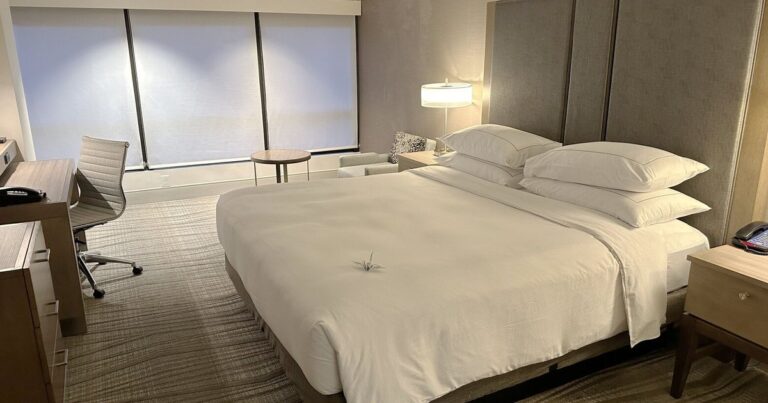The sale of the downtown Seattle Hilton last week is the latest warning sign from a hospitality industry still grappling with recovering from COVID-19.
Tokyo-based APA Group bought the 256-room property for $69 million, according to county property records, 15 percent less than what New York City-based Westbrook Partners sold it for in 2016, adjusted for inflation.
The discount is due in part to its age: The hotel, which has already been converted under APA’s Coast Hotels brand, has been a fixture at the corner of 6th Avenue and University Street since 1970.
But the prices also reflect ongoing uncertainty for Seattle’s tourist-based economy, particularly for lodging.
Coast, which operates hotels across western North America including the Bellevue, Pullman, Seattle-Tacoma International Airport and Wenatchee, declined to disclose sales or other data for the former Hilton.
But while overall occupancy rates in downtown Seattle have risen since the pandemic, they are still below 2019 levels, despite rising costs such as labor and insurance, according to commercial real estate services and investment firm CBRE.
“If you sell [a hotel] “Today, revenues are lower than they were back then, so you’re going to get a lower number,” said Chris Burdett, a hotel expert and vice president at CBRE’s Seattle office. “It’s very simple economics.”
Some parts of downtown’s hospitality industry are coming back stronger: The Seattle Convention Center expects attendance to be 30% higher in 2024 than in 2019, according to the Seattle Tourism Board, an industry group.
According to the Seattle Historic Waterfront Association, tourism to Seattle’s waterfront is expected to increase by 3% in 2023 over 2019.
Waterfront Association board member (Ivers president) Bob Donegan attributes that to a recovery in the cruise industry, steady progress on the city’s new waterfront park and “a growing perception that the waterfront is safe and clean.”
But other parts of the tourist-dependent economy remain in limbo.
According to data released by the Downtown Seattle Association for May, the total number of tourists visiting downtown was down 7% compared to 2019. Crowds at Pike Place Market in April averaged about a quarter lower than in April 2019, according to data from the Downtown Seattle Association.
What’s particularly challenging for hoteliers is that continued remote work and video conferencing continues to have a negative impact on “business travel overall,” Burdett said.
All of this is leading to lower demand and revenue for hotels. According to data from the Seattle Convention and Visitors Bureau and the U.S. Bureau of Labor Statistics’ inflation calculator, the average downtown room rate in April was $197, about 15% lower than April 2019 when adjusted for inflation. Overall downtown hotel revenue was down 20% when adjusted.
Outlook for the future is mixed: Burdett and other experts see demand increasing due to a new and expanded convention center and a waterfront park scheduled for completion in 2025. Major sporting events like the 2026 FIFA World Cup also could draw hordes of tourists willing to spend money.
But uncertainty remains: Demand for hotel rooms could slow, in part because of a drop in business travel.
Cassia Russell, a hotel appraisal expert with HVS Hotel Management in Portland, said the post-pandemic recovery the hotel industry was enjoying in 2021 and 2022 has already “started to stall.” “We’re still moving in the right direction in terms of recovery, it’s just happening at a slower pace,” she said.
But even with the slowing demand, the number of hotel rooms in downtown Seattle is growing from 16,647 in 2019 to about 18,000 this year, according to CBRE, which predicts that downtown’s average daily occupancy rate could exceed 2019 levels until 2027.
Another immediate pressure point: More than a dozen hotels in the Seattle area have loans that mature this year or in 2025, according to HVS, and rising capital costs could make refinancing difficult, especially for underperforming hotels.
All of this could mean a bargain for investors willing to bet on the sector’s eventual recovery.
In fact, APA purchased the former Seattle Hilton for 25% less than the $92 million value the county tax assessor gave it in 2023.
HVS’s Russell believes part of the discount may reflect the investment the more than 50-year-old hotel needed to make “to maintain the Hilton brand,” which he estimates to be “more than $100,000 per room,” or $26 million.
Coast declined to say how much it plans to invest in the new hotel, but a spokesman said it will continue to be managed by Stonebridge Hospitality Management and will target “high-value guests” for both leisure and business.
The hotel will also be undergoing several upgrades, including a “lobby refresh,” 55-inch flat screens and in-room bidets.

